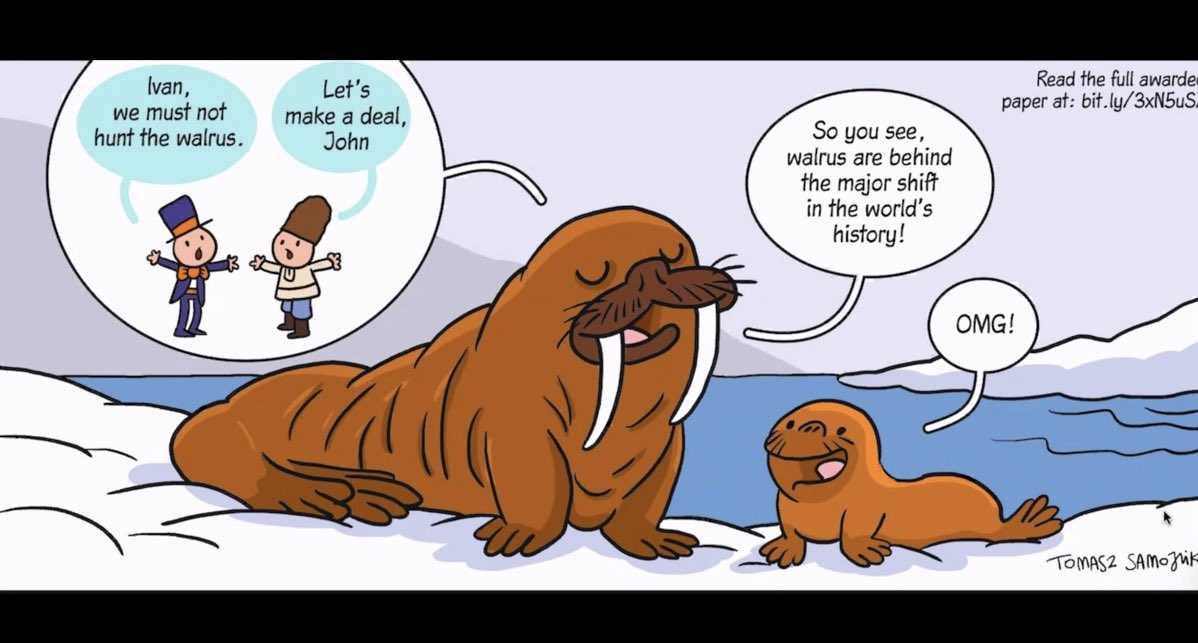-
Award Winner
Congratulations!
The ARTICLE PRIZE goes to Bathsheba Demuth’s article “The Walrus and the Bureaucrat: Energy, Ecology, and Making the State in the Russian and American Arctic, 1870-1950”.
The article stands out, first of all, for the originality of its research: by examining the walrus in the Bering Strait as a source of energy for American and Russian policies in the Arctic, it combines animal, environmental and energy history and reveals the ecological processes on which states as different as the Soviet Union and the United States have to rely. The article is also extremely well-written, offering different points of view – among which the walrus’s – and nicely intertwines narration and conceptualisation. One of the strengths of Bathseba Demuth’s work is indeed its strong theoretical contribution to the field of environmental history and its ability to easily circulate from facts to ideas, offering new insights on state-building, limits to growth, preservationist policies, and the common reliance of communist or capitalist regimes on increased energy consumption for their development for instance. Finally, the article demonstrates an admirable command of the historiography but also of the sources, be they Russian or American, and is grounded on solid empirical research that makes use of a great variety of archives.
Call for Submissions
The European Society for Environmental History (ESEH) welcomes submissions for the 2021 St Andrews Article Prize in European Environmental History.
The prize rewards innovative and well-written article-length research in the field of European environmental history. Articles (or book chapters that are to be read as a stand-alone work) published in 2019 or 2020 on any subject in European environmental history, including Europe’s (post)colonial impact on the global environment, and in any European language, are eligible. We welcome applications from senior and junior scholars from all over the world, though some preference may be given to junior scholars.
The winner will receive a monetary award of EURO 500 as well as a travel grant (if needed) to attend the 11th ESEH Conference from 5-9 July 2021 in Bristol, United Kingdom. In case you need financial travel assistance to come to Bristol, please inform us in your submission.
Additionally, environmental historian and cartoonist Tomasz Samojilik has offered to sketch a ‘scientific cartoon’, a witty graphic summary of the winning article, given the authors’ consent.
In line with the diversity of interdisciplinary environmental history, we accept both single- and multi-authored manuscripts. In case of the latter, submitters must notify all co-authors of the submission. Nominations are limited to one article per main author. However, you can appear as a second or third author on other submissions. You can nominate articles by other authors but only if the authors agree to the nomination. Please note that the financial award is a fixed amount, independently of the number of authors.
Deadline for submissions is January, 15, 2021. Applicants are asked to submit their published article by email as a PDF to k.kalmbach@tue.nl. If the language of publication is not English, applicants should include a one-page summary in English. The winner will be notified by the end of April 2021.
Members of the 2021 St Andrews Article Prize in European Environmental History committee:
Karena Kalmbach (chair), TU Eindhoven (Netherlands)
Santiago Gorostiza, Centre d’Histoire de Sciences Po (France)
Charles-François Mathis, Centre d’Etude des Mondes Moderne et Contemporain (CEMMC), Université Bordeaux Montaigne (France)
Latest news
- Conference: Forest of Numbers (Turin, 10-11 July 2025)
- Call for Proposals: “Premodern Ecologies” Seminar Series 2025-26 at the Newberry Library (Chicago, USA)
- ESEH 2025 Elections: Check out our candidates!
- New Environmental Humanities Initiative at the University of Granada (Spain)
- ESEH Election Time is Coming!
